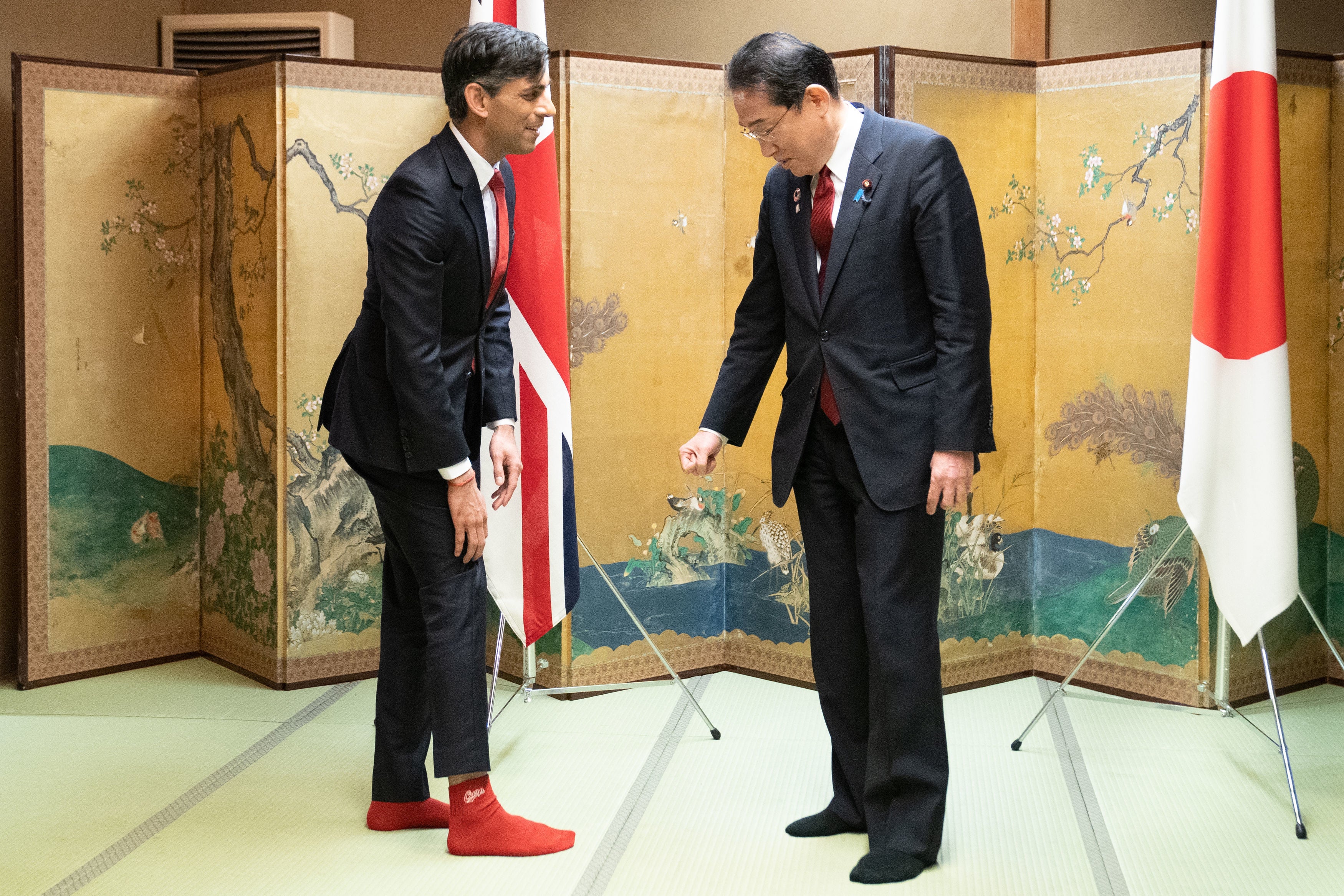Why does Japan matter to the UK?
As Rishi Sunak heads to Hiroshima, he and his Japanese counterpart have much to discuss, says Sean O’Grady


Rishi Sunak is in Tokyo to announce a new defence partnership with Japan and support £18bn of private business deals. He will then join in with the wider G7 talks with other leaders, from Canada, France, Germany, Italy and the United States. They’ll be focusing on strategy towards Russia and China, with an obvious focus on the war in Ukraine.
Mr Sunak hosted a business reception in Tokyo with his counterpart, Fumio Kishida, before travelling to Hiroshima, where he will sit down with allies including Joe Biden to discuss support for Ukraine in its fight against the Russian invasion.
On Friday, Mr Sunak will visit the A-bomb Dome to reflect on the nuclear devastation at the end of the Second World War.
Why does Japan matter to the UK?
Mr Sunak is reported to feel that Japan is a like-minded country that shares his interest in technology and innovation. There has always been a romantic idea that the two island nations are in some ways mirror images – each a (mostly) densely populated, outward-looking maritime power with an ancient monarchy, perched on the edge of a great continent.
Both sides prefer to gloss over the war that was fought with great ferocity – and also with some notoriety in the case of the Japanese prisoner of war camps – between 1941 and 1945, and instead to concentrate on the wider strategic partnership of today, which is underpinned by common values and the economic relationship.
Until Brexit, Japan was a major and reliable inward investor to the UK, and helped to transform our manufacturing industry (just as the UK helped Japan to rebuild after 1945), bringing new techniques such as just-in-time assembly. Japan felt betrayed after the Brexit referendum. Some of that damage has been repaired by a new free trade agreement, which is a modestly revised version of the previous treaty with the EU. Britain and Japan are also now both members of the Comprehensive and Progressive Agreement for Trans-Pacific Partnership, along with Canada, Singapore, Australia, Mexico, Chile and others.
Mr Sunak will also preside over fresh commitments to invest from Toshiba, Sumitomo and Mitsubishi, amounting to some £18bn eventually being poured into UK wind farms, property, and other projects. The two sides will also try to improve the supply of semiconductors, which are used in everything from smartphones to washing machines, given the geopolitical uncertainties affecting Taiwan and China.
Mr Sunak and Mr Kishida will no doubt also discuss the future of the British car and battery industries, given the substantial presence of Nissan and Toyota in Britain.
What will the new defence pact with Japan involve?
The Hiroshima Pact is the first bilateral defence agreement between the UK and Japan since 1902. The original Anglo-Japanese Alliance was aimed at protecting mutual interests relating to China, Russia and Korea, and, though the context is rather different 121 years later, that’s pretty much what the game is in 2023.
It obliges both sides to consult one another on military decisions, encourages the partners to undertake joint naval exercises in the Indo-Pacific region, and reaffirms friendly relations. The naval relationship goes back a long way; when Japan was rapidly modernising in the second half of the 19th century, the country modelled its navy on Britain’s Royal Navy and its army on that of Germany.

Although Japan’s military spending has been limited in recent decades to about 1 per cent of its national income, such is the size of its GDP that this currently represents about £40bn a year (roughly the same amount as the UK spends) and Japan has built the eighth-biggest military in the world. Last December, the country adopted a new national security strategy, which will edge defence spending higher and focus on “counterstrike” capabilities such as missile systems. The hope is that this might deter North Korea, in particular, from carrying out further reckless missile tests. America is also boosting its military presence in the region.
Isn’t Japan a pacifist nation?
Yes. After the atrocities and aggression in the 1930s and 40s, Japan renounced war under Article 9 of its new democratic constitution. The imperial Japanese fighters were redesignated a self-defence force, and the national ethos was of extreme pacifism, in revulsion at the horror of Japan’s wars and the nuclear devastation wreaked on Hiroshima and Nagasaki. Nuclear weapons, as are being developed by North Korea, still hold a particular horror for the Japanese, but in recent decades there has evolved a more assertive strain in the country’s politics, and rules surrounding deployment of Japanese forces abroad, such as in peacekeeping missions, have been relaxed.
Are there any votes in this diplomacy?
Not in a British general election, but it never does a prime minister any harm to be seen on the world stage. In pursuing a cautious but practical policy in the region, trying to contain China without undue provocation, Mr Sunak appears more statesmanlike than Liz Truss, who was this week grandstanding in Taiwan. By visibly consorting with Biden, Emmanuel Macron and Narendra Modi, he has also put his publicity-hungry predecessor, now a backbencher, firmly back in her box.






Join our commenting forum
Join thought-provoking conversations, follow other Independent readers and see their replies
Comments